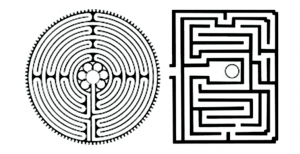Rev’d Peter Balabanski
Pentecost + 13A – Ex 3 Rm 12 Mt 16
Jesus said …, If any want to become my followers, let them deny themselves, take up their cross and follow me. Matt 16.24–25
There’s a remarkable story in the book of Jeremiah that’s never read in our worship services – for reasons which will become obvious. Jeremiah’s ministry had bits he’d rather have avoided. This time, (Ch 13) he had to buy a loincloth and preach in it for a long time without washing it. Then God told him to go and bury it in a cleft in the rock by the Euphrates River. Much later, God sent him back to the river to dig up his loincloth and resume preaching in it. We can only imagine how he looked.
First impressions make or break a person’s image. God wanted to show Israel and Judah how their way of living gave everybody a shocking first impression of God. As a people called to showcase the goodness of God to the nations, they were a disgrace. God says V. 11 ‘… as the loincloth clings to one’s loins, so I made … Israel and … Judah cling to me as the Lord, in order that they might be for me a people, a name, a praise, and a glory, but they would not listen.’
We’ve been thinking about our identity as the Body of Christ. We are like Christ’s clothing; the first impression people get of Jesus. As a community, being Jesus here and now is our true identity; our calling is to be living icons of Christ in our time and place. In the language of Jeremiah’s prophetic action, we’re the intimate clothing Christ wears; the first impression people get of what Jesus might be like.
Identity is partly nature, partly nurture, partly choice. And God’s people are able to make astounding choices. Last week, we heard the voices of Muslim people in Aotearoa/NZ. One voice struck me particularly; Janna Ezat’s. Her son Hussein was murdered at Al Noor Mosque. In court, she told the gunman “I decided to forgive you … In our Muslim faith we say . . . we are able to forgive. I forgive you. Damage was done and Hussein will never be here so I have only one choice to forgive you.”
God’s people can choose to show what God is truly like. Mostly, it means choosing the way of giving things up; choosing the more vulnerable way, as this mother did.
It goes against the grain to choose this way; we saw it in today’s scriptures; Peter’s allergic reaction to Jesus speaking about his coming passion, death and resurrection – Peter rebukes Jesus for talking like that; he calls on God to prohibit such a path. And Moses is hardly a model of enthusiasm when God tells him what his mission is. The way of – is it weakness, or is it trust? Whichever we call it, it doesn’t come naturally; it’s almost always a deliberate choice. But when we choose to accept this way – this pilgrimage – God is revealed. This will happen in a time and manner of God’s choosing. But we must know that I AM has called us – I AM sends us.
Last Sunday, I spoke briefly of a conversation where we discussed working on three aspects of our life as a parish to develop our ongoing mission as disciples of Jesus; those three things are Sanctuary, Community and Pilgrimage. Last week, our scriptures got us exploring Community – St John’s’ identity as the Body of Christ in this part of the city. Today the scriptures draw our focus to Pilgrimage. Moses is embarking on the Exodus – the perilous journey out of slavery for God’s people. And in the gospel, Jesus is inviting his disciples to the daunting Way of the Cross.
I believe that as a pilgrim people, the choices we make as we travel alongside others have the potential to reveal the companionship and the ways of God. Paul obviously thought this way when he wrote to the Christians in Rome. He portrayed those choices as revealing the love of God through our choices for love for others.
Let love be genuine; … show honour. … Rejoice in hope, be patient in suffering, persevere in prayer. Give to saints and strangers. Bless those who persecute you; don’t curse them. Rejoice with those who rejoice, weep with those who weep. Live in harmony … don’t be haughty, associate with the lowly. Don’t repay anyone evil for evil, but take thought for what is noble in the sight of all. So far as it depends on you, live peaceably with all. Never avenge yourselves; no, ‘if your enemies are hungry, feed them; if they are thirsty, give them something to drink. Don’t be overcome by evil, but overcome evil with good.
As street directory for walking in the footsteps of Jesus, this is crystal clear. When people choose to accept this path – this pilgrimage – Christ is revealed to our fellow travellers. When we decide on a new mission, these are clear directions for helping us find our way, and for welcoming fellow travellers to come with us. Amen

